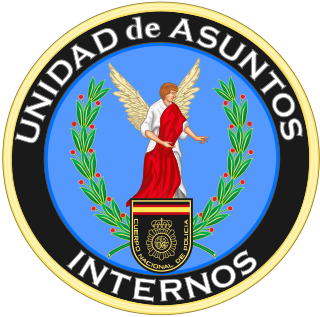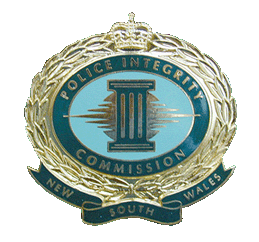Related Research Articles

The Regulation of Investigatory Powers Act 2000 (c.23) is an Act of the Parliament of the United Kingdom, regulating the powers of public bodies to carry out surveillance and investigation, and covering the interception of communications. It was introduced by the Tony Blair Labour government ostensibly to take account of technological change such as the growth of the Internet and strong encryption.

Internal affairs is a division of a law enforcement agency that investigates incidents and possible suspicions of criminal and professional misconduct attributed to members of the parent force. It is thus a mechanism of limited self-governance, "a police force policing itself". The names used by internal affairs divisions vary between agencies and jurisdictions; for example, they may be known as the internal investigations division, professional standards or responsibility, inspector or inspectorate general, internal review board, or similar.

Law enforcement in the United Kingdom is organised separately in each of the legal systems of the United Kingdom: England and Wales, Northern Ireland and Scotland. Most law enforcement is carried out by police officers serving in regional police services within one of those jurisdictions. These regional services are complemented by UK-wide agencies, such as the National Crime Agency and the national specialist units of certain territorial police forces, such as the Specialist Operations directorate of the Metropolitan Police.
The Serious Organised Crime Agency (SOCA) was a non-departmental public body of the Government of the United Kingdom which existed from 1 April 2006 until 7 October 2013. SOCA was a national law enforcement agency with Home Office sponsorship, established as a body corporate under Section 1 of the Serious Organised Crime and Police Act 2005. It operated within the United Kingdom and collaborated with many foreign law enforcement and intelligence agencies.
A police authority in the United Kingdom is a public authority that is responsible for overseeing the operations of a police force. The nature and composition of police authorities has varied over time, and there are now just four dedicated "police authorities" in the United Kingdom, although the term can refer to various similar successor bodies.
A police board is an appointed form of local government charged with the responsibility of overseeing a local police force.

The Independent Police Complaints Commission (IPCC) was a non-departmental public body in England and Wales responsible for overseeing the system for handling complaints made against police forces in England and Wales.
The Police Complaints Authority (PCA) was an independent body in the United Kingdom with the power to investigate public complaints against the Police in England and Wales as well as related matters of public concern. It was formed in 1985, replacing the Police Complaints Board and was then itself replaced by the Independent Police Complaints Commission (IPCC) in April 2004.

The Ethical Standards in Public Life etc. (Scotland) Act 2000 is an Act of the Scottish Parliament which established that the Scottish Ministers had to issue a code of conduct for councillors, and put in place mechanisms for dealing with councillors in contravention of the code. It was introduced by Scottish Executive minister Wendy Alexander.

The NYC Civilian Complaint Review Board (CCRB) is the civilian oversight agency of the New York City Police Department (NYPD), the largest police force in the United States. A board of the Government of New York City, the CCRB is tasked with investigating, mediating and prosecuting complaints of misconduct on the part of the NYPD. Its regulations are compiled in Title 38-A of the New York City Rules.
The Independent Police Conduct Authority is an independent civilian oversight body that considers complaints against the New Zealand Police and oversees their conduct. It derives its responsibilities and powers from the Independent Police Conduct Authority Act. Under section 12.1 of the Act, the Authority's functions are to receive complaints alleging misconduct or neglect of duty by police employees; or concerning any practice, policy, or procedure of New Zealand Police and to take action as contemplated by the Act. It may also investigate any police incident involving death or serious bodily harm and make recommendations to the Commissioner of Police based on those investigations.

The Office of Ombudsman is a Hong Kong statutory authority, established on 1 March 1989, charged with ensuring that Hong Kong is served by a fair and efficient public administration that is committed to accountable, openness and quality of services. It operates mainly by investigating and giving recommendations to government departments.

The Police Act 1964 was an Act of the Parliament of the United Kingdom that updated the legislation governing police forces in England and Wales, constituted new police authorities, gave the Home Secretary new powers to supervise local constabularies, and allowed for the amalgamation of existing forces into more efficient units.

The Police Integrity Commission, was a statutory corporation of the New South Wales Government, responsible for the prevention, detection, and investigation of alleged serious misconduct in the Police Force in the state of New South Wales, Australia. The mission of the commission was to be an effective agent in the reduction of serious police misconduct. On 1 July 2017, the Police Integrity Commission was abolished and replaced by the Law Enforcement Conduct Commission.
The Scottish Public Services Ombudsman (SPSO) is the organisation that handles complaints about public services in Scotland. The Ombudsman service is independent of government and with a duty to act impartially.

The Advertising Standards Authority (ASA) is the self-regulatory organisation of the advertising industry in the United Kingdom. The ASA is a non-statutory organisation and so cannot interpret or enforce legislation. However, its code of advertising practice broadly reflects legislation in many instances. The ASA is not funded by the British government, but by a levy on the advertising industry.
The Civilian Review and Complaints Commission for the Royal Canadian Mounted Police (CRCC) is an independent agency. Created by Parliament in 1988, the Commission ensures that public complaints made about the conduct of RCMP members are examined fairly and impartially. The Commission receives complaints from the public and conducts reviews when complainants are not satisfied with the RCMP’s handling of their complaints.
The Independent Office for Police Conduct (IOPC) is a non-departmental public body in England and Wales which, since 8 January 2018, is responsible for overseeing the system for handling complaints made against police forces in England and Wales. Most allegations of police misconduct are investigated by police forces' own professional standards departments. However the IOPC does conduct independent investigations of serious allegations of misconduct or criminal offences by police officers and other law enforcement officers. 'Mandatory' referrals are usually made to the IOPC should a person die or sustain serious injuries following police contact. Additionally, a force's professional standards department may also make a 'voluntary' referral – in which a force will ask the IOPC to consider if they wish to investigate independently, supervise a force professional standards investigation, or decline and refer the investigation back to the force to investigate without any IOPC input. The office received over 4300 referrals from police forces and completed about 700 investigations in the 2019/20 year.
The Royal Canadian Mounted Police (RCMP) is Canada's national police force established in 1920 after the Cabinet moved to have the Royal North-West Mounted Police absorb the Dominion Police. The RCMP's primary mandate is to maintain "peace and order," and Officers provide police services to all Canadian provinces, excluding Québec and Ontario, as well as to the three Canadian territories, and more than 180 municipalities and Indigenous communities.
References
- ↑ Waters, Ian; Brown, Katie (2000), "Police Complaints and the Complainants' Experience", The British Journal of Criminology , 40 (4): 617–638, doi:10.1093/bjc/40.4.617
- ↑ Brown, David (1987), The Police Complaints Procedure; A Survey of Complainants' Views (PDF), Home Office Research Studies, archived from the original (PDF) on 8 December 2010
- ↑ Raghavan, R.K. "Dealing with police misconduct". Frontline. Archived from the original on 27 September 2007.
- ↑ "A Fair Cop?". Scottish Executive.